DIY Elderberry Syrup for Immune Health
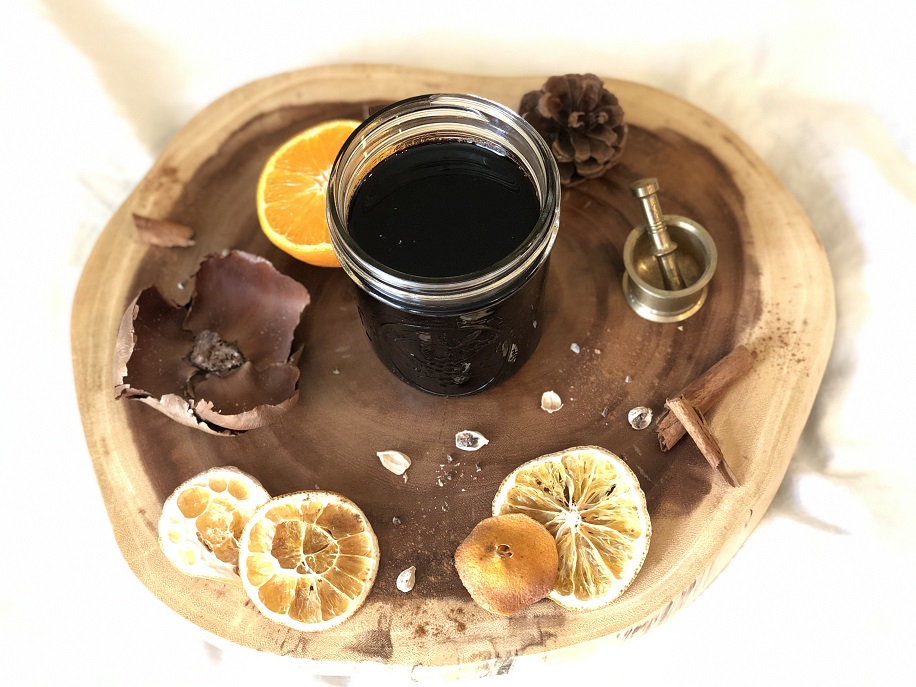
“Nature itself is the best physician.” Hippocrates
Now more than ever we need to take care of ourselves and keep our immune systems healthy and strong. Elderberry syrup can help provide support to your immune system during this time of insecurity and unease. (1) In this article, you will discover the benefits of homemade elderberry syrup, the amazing qualities of all the elderberry syrup ingredients, as well as, the DIY Elderberry Syrup Recipe for Immune Health.
Table of Contents
Why make your own elderberry syrup?
Elderberry syrup can be used daily in winter months during cold and flu season to boost immune health. When cold and flu symptoms do arise, the dose is increased. In the past, I have purchased and used elderberry syrup when I started to feel unwell but was not able to take it as a precautionary measure as elderberry syrup can be very expensive when store-bought.
I decided to do some research and compare pricing for homemade syrup vs store bought. I used ½ cup dried elderberries in this recipe and it made about 2 cups of syrup. You can purchase 4 oz of good quality dried elderberries for around $8. A good quality store-bought syrup will be about 4 times as much.
Another great benefit of making your own elderberry syrup is that you can tailor the ingredients to your needs and to your liking. This recipe uses a healthy spice blend, but you can also switch it up and make it with herbs such as mint, rosemary, and thyme. These herbs are helpful for suppressing coughs, clearing nasal passages, improving digestion and many other benefits.
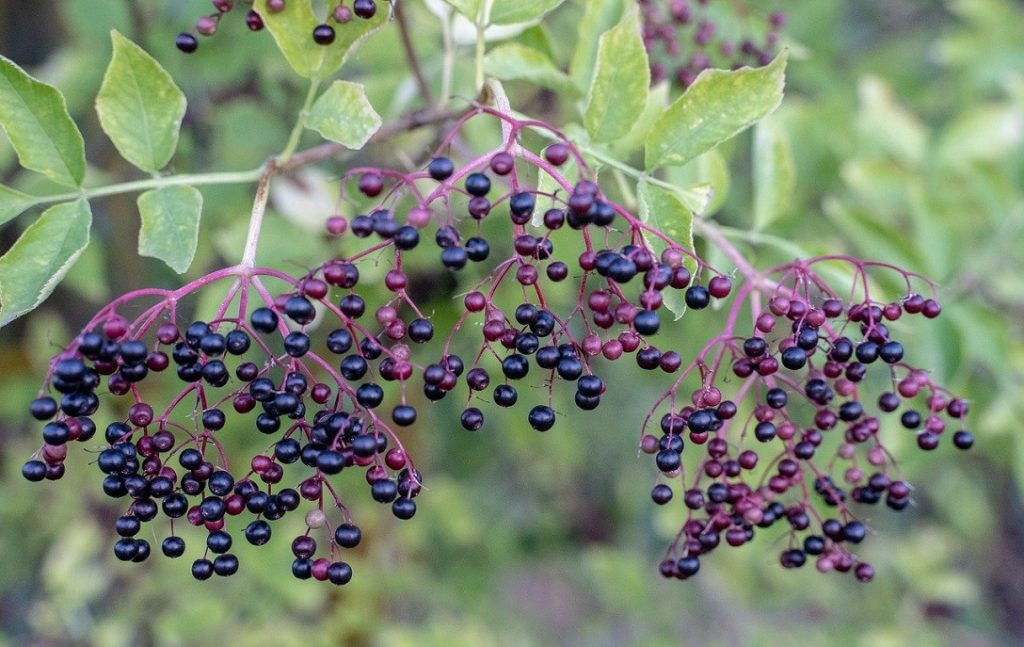
Elderberry Syrup Ingredients and their Benefits
Elderberry:
Elderberry, Sambucus nigra (the most common species), is a flowering plant from the Adoxaceae family native to North America and Europe. Native Americans and Europeans have been using elderberry for medicinal purposes for hundreds of years. Both the flowers and the berries are used for medicinal purposes. It is best to avoid the leaves and bark as they can be toxic.
Elderberries contain many vitamins and minerals including vitamin A and C, potassium, calcium, folate, iron and are a great source of fiber. Elderberries are high in antioxidants and have anti-inflammatory, antiviral, and antibacterial properties. Elderberries help stimulate the immune system, improve heart health, lower cholesterol and help regulate the digestive system. Elderberries are an expectorant and can help relieve nasal and lung congestion.
Studies have shown that consuming elderberries when flu symptoms arise can reduce the severity and duration of the common cold and flu. One study, in particular, gave participants 15 ml of elderberry syrup four times a day for five days. Those who took the elderberry syrup within the first 48 hours of initial onset, had symptom relief 4 days earlier than those who took the placebo. (2,3,4)
Ginger:
Ginger, a perennial plant, is part of the Zingiberaceae family and is native to southeast Asia. The rhizome, the underground stem, is the portion of the plant that is traditionally used in cooking and for medicinal purposes. Ginger has been used for thousands of years to treat colds, sinus pain, and congestion. Ginger is an expectorant and promotes a healthy immune system. (5) Gingerol and shogaol are the main bioactive compounds that provide the anti-inflammatory, antioxidant, antiviral and anti-cancer effects of ginger. (6,7) Ginger is antispasmodic and can help relieve digestive upset as well as nausea.
Honey:
Unprocessed Raw Honey has been used by humans since ancient times. Honey has antibacterial, anti-inflammatory, antiviral, and antioxidant properties. Flavonoids and polyphenols are the 2 main bioactive compounds in honey. Honey has been known to heal wounds as well as soothe sore throats. Honey may also have anti-cancer and immune regulatory effects on the body as well as help manage certain conditions related to cardiovascular, gastrointestinal and neurological diseases. (8, 9)
Honey should not be given to children under the age of 1. They are at risk of infant botulism, a rare but serious form of food poisoning.
Cinnamon:
Cinnamon comes from the bark of Cinnamomum trees and is part of the Lauraceae family. Cinnamon has a long history and has been used for thousands of years. The earliest record of cinnamon use is found in Chinese writings around 2800 B.C. and in Egypt as early as 2000 B.C. Cinnamon is loaded with antioxidants and has anti-inflammatory, antimicrobial, antidiabetic and anticancer properties as well as many others. (10)
Cardamom:
Cardamom, a perennial plant, is also part of the Zingiberaceae family. Cardamom is used to help relieve digestive problems, the common cold, and headaches. Cardamom also improves oral health and improves immune function. Cardamom has anti-cancer, antioxidant, anti-inflammatory and antibacterial properties. (11, 12)
Clove:
Cloves are flower buds of a tree in the Myrtaceae family and are native to Indonesia. Cloves are high in antioxidants with anti-cancer, anti-inflammatory, and antimicrobial properties. Cloves help boost the immune system, improve oral and digestive health, and blood pressure regulation. (13)
Orange Peel:
The orange originated in China and is part of the Rutaceae family. Orange peels are high in vitamin C, vitamin A, B vitamins, fiber, calcium, potassium, and flavonoids. Orange peels have anti-inflammatory, anticancer and antioxidant properties. Consuming orange peel can help strengthen the immune system, improve digestion, aid in heart health and help prevent cancer. (14, 15,16, 17)
Vanilla:
Vanilla is native to Mexico and is part of the Orchidaceae family. Vanilla is high in vitamin B2, manganese, and copper. Vanilla is known for its anti-inflammatory, antioxidant and antibacterial properties. Vanilla has been used in foods for those with weak immune systems and may also help reduce fevers naturally. (18,19)
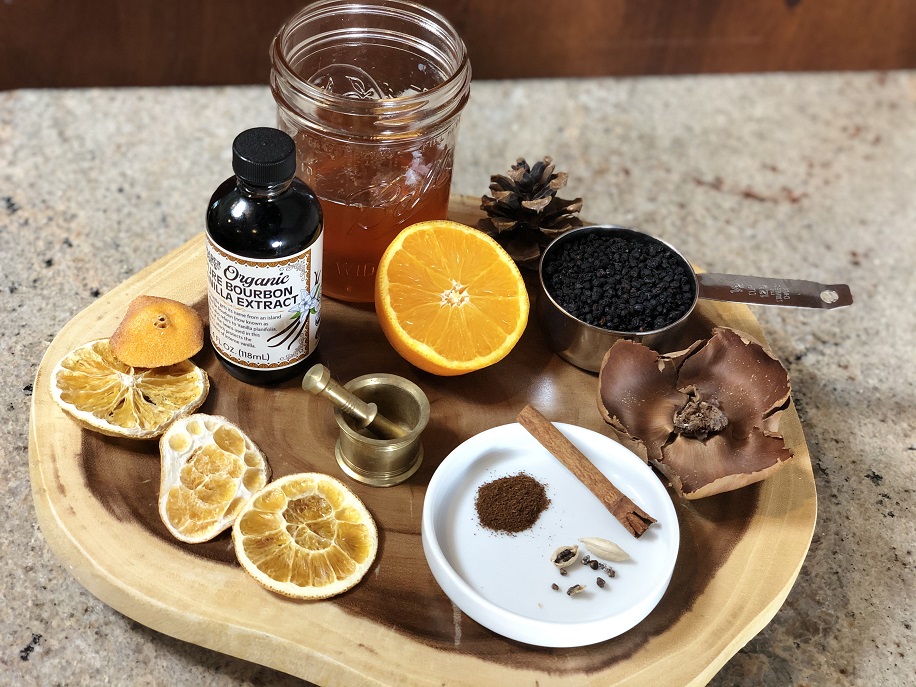
Elderberry Syrup Tips
- Elderberry bark and leaves are toxic. Do not use them when preparing elderberry syrup.
- Eating raw elderberries may cause stomach upset. Best if consumed cooked.
- Use dried or fresh elderberries in this recipe.
- Use maple syrup or brown rice syrup for infants under the age of 1.
- Maple syrup or brown rice syrup are great vegan substitutes.
- Use a stainless steel or ceramic pot when preparing. Stay away from non-stick pans that contain perfluorooctanoic acid or PFOA, a possible carcinogen.
- Store in a sealed glass container in the refrigerator.
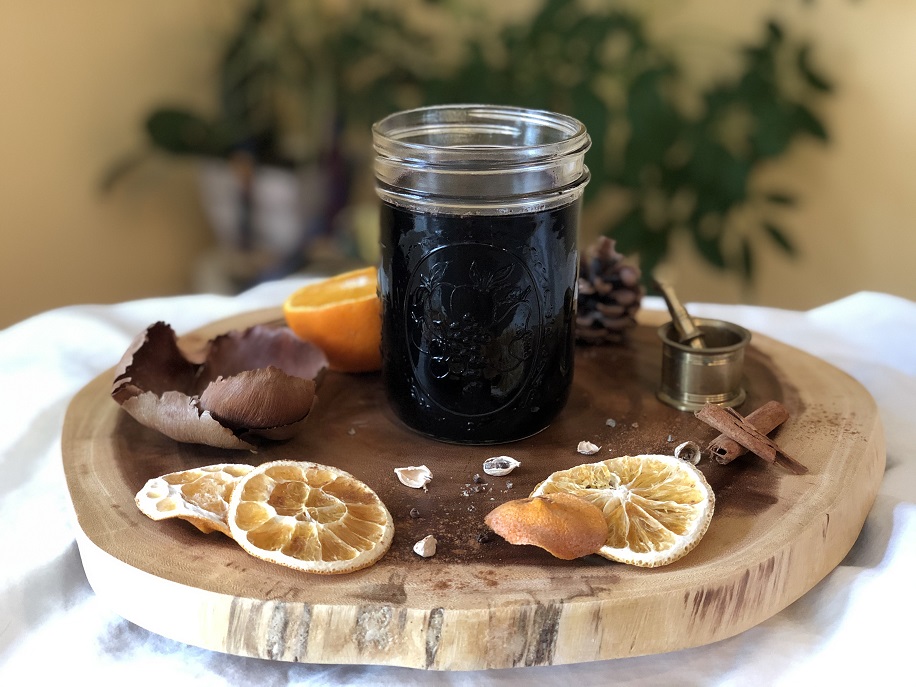
DIY Elderberry Syrup for Immune Health
Ingredients
Equipment
Method
- Combine elderberries, water, ginger, orange peel, cardamom, cinnamon and cloves in a medium-sized pot. It is best to use a stainless steel or ceramic pot for this recipe.
- Bring just to a boil on medium heat and reduce to a simmer.
- Partially cover and simmer for about 20 – 30 minutes or until liquid is reduced in size by half. Uncover for the last 5 minutes, if needed.
- Occasionally stir throughout the cooking process.
- When the liquid has reduced, turn off the heat and allow it to steep and slightly cool for about 5 minutes.
- Strain the mixture using a fine mesh strainer into a large glass measuring cup or bowl. Use a spoon to press the berries and extract as much juice as possible. Alternatively, a nut milk bag or cheesecloth may be used. Squeeze by hand to extract all of the liquid.
- Add the vanilla extract and honey and stir until well combined.
- Pour into a glass mason jar or container, top with a lid and store in the refrigerator.
Notes
***Health Disclaimer: I am not a medical professional. This article is for informational purposes only. The content in this article should not be substituted for medical advice. Always consult a medical professional before making any healthcare changes. Written by a Mama who loves to research, learn, and share experiences, thoughts, tips, and ideas on nutrition and health.***

Have you used or made your own elderberry syrup? How has it benefited you?
Want even more of an immune boost? Use this recipe in addition to maintaining a healthy diet. Visit our Nutrition Confusion article for information on the best whole foods to optimize your health along with 10 simple nutrition tips.
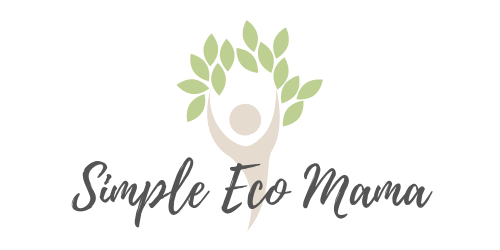

Great recipe just 2 side notes ..‘first one squeeze every bit of
Goodness from those berries and second use a wooden spoon the metal ones
Kill the honey ..
Thank you for your tips! I didn’t show much of the straining process in the video. I will definitely add that step to the instructions. Thank you for bringing that to my attention. I wasn’t aware that metal spoons kill the honey. I will look into that for sure.
Thank you so much for sharing this! I am definitely bookmarking. We’ve heard of the benefits of elderberry but it is so expensive if you go to the store to get syrup. Even the gummies are expensive. So I am definitely going to give this recipe a try 🙂
Thank you for your comment. I agree! Not only is this recipe a lot less expensive, but super easy and quick to make. I hope you are able to give it a try. If you do, please let me know how it goes! 🙂